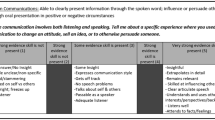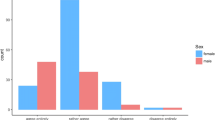Abstract
Background
Medical knowledge is essential for appropriate patient care; however, the accuracy of internal medicine (IM) residents’ assessment of their medical knowledge is unknown.
Methods
IM residents predicted their overall percentile performance 1 week (on average) before and after taking the in-training exam (ITE), an objective and well accepted method to assess medical knowledge to study resident assessment accuracy. Ordinary least squares regression was used to study the association between the absolute accuracy of their predictions of their percentile performance on the ITE examination and their actual percentile performance.
Results
Ninety-three percent of our 28 residents participated. Residents were highly inaccurate in predicting their percentile performance. Only 31% had ITE scores that were within 10 points of their predictions. On average, most residents were pessimistic about their overall percentile performance with 18 (69%) underestimating their performance. Having just taken the examination and previous experience with the examination did not improve predictions of percentile performance.
Conclusion
IM residents did not accurately predict their own level of medical knowledge. Taking the examination and experience with previous exams does not appear to improve the ability of these IM residents to predict their performance. Residents need to be taught to rely on the results of standardized examinations such as the ITE to best assess their overall medical knowledge. The factors important for accurate self-assessment of medical knowledge in individual clinical situations remain unexplored.

Similar content being viewed by others
References
ACP In-Training Exam. (n.d.) Retrieved August, 2005, from: http://www.acponline.org/cme/itelg.htm?idxt/InTraining Exam.
Arnold, L., Willoughby, T. L., & Calkins, E.V. (1985). Self-evaluation in undergraduate medical education: A longitudinal perspective. Journal of Medical Education, 60(1), 21–28.
Colliver, J., Verhulst, S., & Barrows, H. (2005). Self-assessment in medical practice: A further concern about the conventional research paradigm. Teaching and Learning in Medicine, 17(3), 200–201.
Coutts, L., & Rogers, J. (1999). Predictors of student self-assessment accuracy during a clinical performance exam: Comparisons between overestimators and under-estimators of standardized patient evaluated performance. Academic Medicine, 74(10 Suppl), S128–S130.
Crunden, E. J. (1991). An investigation into why qualified nurses inappropriately describe their own cardiopulmonary resuscitation skills. Journal of Advanced Nursing, 16(5), 597–605.
Eva, K., & Regehr, G. (2005). Self-assessment in the health professions: A reformulation and research agenda. Academic Medicine, 80(10 Suppl), S46–S54.
Farnill, D., Hayes, S. C., & Todisco, J. (1997). Interviewing skills: Self-evaluation by medical students. Medical Education, 31(2), 122–127.
Gordon, M. J. (1991). A review of the validity and accuracy of self-assessments in health professions training. Academic Medicine, 66(12), 762–769.
Gruppen, L. D., Garcia, J., Grum, C. M., Fitzgerald, J. T., White, C. A., & Dicken, L. (1997). Medical students’ self-assessment accuracy in communication skills. Academic Medicine, 72(10 Suppl 1), S57–S59.
Gruppen, L. D., White, C., Fitzgerald, J. T., Grum, C. M., & Woolliscroft, J. O. (2000). Medical students’ self-assessments and their allocations of learning time. Academic Medicine, 75(4), 374–379.
Hodges, B., Regehr, G., & Martin, D. (2001). Difficulties in recognizing one’s own incompetence: Novice physicians who are unskilled and unaware of it. Academic Medicine, 76(10 Suppl), S87–S89.
Kruger, J., & Dunning, D. (1999). Unskilled and unaware of it: how difficulties in recognizing one’s own incompetence lead to inflated self-assessments. Journal of Personality and Social Psychology, 77(6), 1121–1134.
Morton, J. B., & Macbeth, W. A. (1977). Correlations between staff, peer and self-assessments of fourth-year students in surgery. Medical Education, 11(3), 167–170.
Rezler, A. G. (1989). Self assessment in problem-based groups. Medical Teacher, 11(2), 151–156.
Sullivan, M. E., Hitchcock, M. A., & Dunnington, G. L. (1999). Peer and self-assessment during problem-based tutorials. American Journal of Surgery, 177(3), 266–269.
Tamblyn, R., Abrahamowicz, M., Dauphinee, W. D., Hanley, J. A., Norcini, J., & Girard, N. (2002). Association between licensure examination scores and practice in primary care. Journal of the American Medical Association, 288(23), 3019–3026.
Ward, M., Gruppen, L., & Regehr, G. (2002). Measuring self-assessment: Current state of the art. Advances in Health Science Education Theory and Practice, 7(1), 63–80.
Winfield, D., Cook, J., Thiss, L., Straessen, J. A., Fletcher, A. E., & Fagard, R. et al. (2002). Terminal digit preference in the Eur trial. Blood Pressure Monitor, 7, 169–177.
Woolliscroft, J. O., TenHaken, J., Smith, J., & Calhoun, J. G. (1993). Medical students’ clinical self-assessments: Comparisons with external measures of performance and the students’ self-assessments of overall performance and effort. Academic Medicine, 68(4), 285–294.
Acknowledgments
The authors would like to thank all of the internal medicine residents who participated in this study and Dr. Neema Doshi for her valuable insights.
Author information
Authors and Affiliations
Corresponding author
Rights and permissions
About this article
Cite this article
Jones, R., Panda, M. & Desbiens, N. Internal medicine residents do not accurately assess their medical knowledge. Adv in Health Sci Educ 13, 463–468 (2008). https://doi.org/10.1007/s10459-007-9058-2
Received:
Accepted:
Published:
Issue Date:
DOI: https://doi.org/10.1007/s10459-007-9058-2




